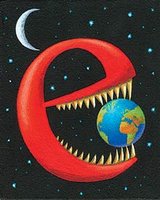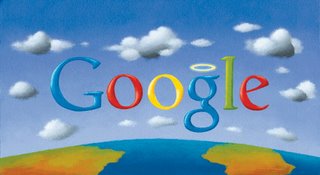Wednesday, April 02, 2008
LEAVING THE AIR FORCE COMPLETELY...




After 10 years of Active and Reserve Duty...I officially will be honorably discharged from the Air Force in Sept 2006.
Labels: Leaving the AF
Saturday, September 09, 2006
Profound comment on Engineering by MIT graduate
If you take a moment to observe your surroundings, you will see examples of
technological creativity. The physical objects you see, whether they are telephones,
automobiles, bicycles, or electric appliances, all came into being through the creative
application of technology. These everyday inventions did not miraculously appear but
originated in the minds of human beings and took time to develop. Engineering is the
creative process of turning abstract ideas into physical representations (products or
systems). What distinguishes engineers from painters, poets, or sculptors is that engineers
apply their creative energies to producing products or systems that meet human needs.
This creative act is called design.
Reference:
Khandani, S. (2005, August). ENGINEERING DESIGN PROCESS: Education Transfer Plan. Retrieved September 9, 2006, from http://iisme.org/etp/HS%20Engineering-%20Engineering.pdf
technological creativity. The physical objects you see, whether they are telephones,
automobiles, bicycles, or electric appliances, all came into being through the creative
application of technology. These everyday inventions did not miraculously appear but
originated in the minds of human beings and took time to develop. Engineering is the
creative process of turning abstract ideas into physical representations (products or
systems). What distinguishes engineers from painters, poets, or sculptors is that engineers
apply their creative energies to producing products or systems that meet human needs.
This creative act is called design.
Reference:
Khandani, S. (2005, August). ENGINEERING DESIGN PROCESS: Education Transfer Plan. Retrieved September 9, 2006, from http://iisme.org/etp/HS%20Engineering-%20Engineering.pdf
Sunday, June 11, 2006
Story Behind this Chip Concept

Captain's Log:
I think this is so cool. Well, the story behind this chip concept comes from when I was stationed in Alaska. A General Officer told us that the Army would someday have to prepare for protecting resources (water supplies, oil, etc). What fascinated me was that he mentioned a satellite that could be observed in the Alaska sky. The General explained that it was so powerful that it could read the seat number in the local theater. He also talked about a chip that could tell if a soldier was dehydrated or overstressed.
Any way... to me imagination is like brainstorming….new ideas come from critical thoughts, that may seem silly, but when men get together amazing things can happen.
I was trained in Ground Radio Communications and Weapons Systems in the US Air Force and have a pretty good understanding of modern technology and its limitations as it relates to electronic technology. Yet, what fascinates me so much is the history of electronics. In the 1940's, the invention of the transistor revolutionized mankind...it bridge the gap for allot of ideas that could not be manifested, but imagined.
Dr. John Bardeen, Dr. Walter Brattain, and Dr. William Shockley discovered the Transistor effect and developed the first device at Bell Laboratories. They were awarded the Nobel Prize in physics in 1956.
Without these minds brainstorming, and merging ideas…think about it… would we have personal computers today?
Monday, May 29, 2006
GOOGLE INSPIRATIONAL ARTICLE

Source:http://www.economist.com/science/displayStory.cfm?story_id=6911096
...The mathematics comes from the founders, Sergey Brin and Larry Page. The Russian-born Mr Brin is the son of a professor of statistics and probability and a mother who works at NASA; Mr Page is the son of two computer-science teachers. The breakthrough that made their search engine so popular was the realization that the chaos of the internet had an implicit mathematical order. By counting, weighting and calculating the link structures between web pages, Messrs Page and Brin were able to return search results more relevant than those of any other search engine.
Mathematical prowess is also behind the other half of Google's success: its ability to turn all those searches into money. Unlike software companies such as Microsoft which get most of their revenues from licence fees, Google is primarily an advertising agency. It does not sell the usual sort of advertising, in which an advertiser places a display on a page and pays per thousand visitor “impressions” (views): it has perfected the more efficient genre of “pay-per-click” advertising. It places little text advertisements (“sponsored links”) on a page in an order determined by auction among the advertisers.
 But these advertisers pay only once an internet user actually clicks on their links (thereby expressing an interest in buying). This works best on the pages of search results, which account for over half of the firm's revenues, because the users' keywords allow Google to place relevant advertisements on the page. But it also works on other web pages, such as blogs or newspaper articles, that sign up to be part of Google's “network”.
But these advertisers pay only once an internet user actually clicks on their links (thereby expressing an interest in buying). This works best on the pages of search results, which account for over half of the firm's revenues, because the users' keywords allow Google to place relevant advertisements on the page. But it also works on other web pages, such as blogs or newspaper articles, that sign up to be part of Google's “network”.At a minimum, this hypothetical transformation would consist of moving computation and data off people's personal computers and on to the network—ie, Google's servers. Other names for this scenario are the “GDrive” or the “Google grid” that the company is allegedly working on, meaning free (but ultimately advertising-supported) copious online storage and possibly free internet access. Free storage threatens Microsoft, because its software dominates personal computers rather than the internet; free access threatens other internet-access providers.
Such concerns are forcing Messrs Brin and Page, still in their early 30s, and Eric Schmidt, whom they hired as chief executive and who is in his early 50s, to behave increasingly like a “normal” company. Google recently sent its first lobbyists to Washington, DC. Its decision to build an “evil scale” to help it devise its China strategy was more unusual, but its hiring of Al Gore, a former American vice-president, to aid the process, was just the kind of thing that old-fashioned empire-building firms do all the time.
RESPONSE TO COMMENTS-PHOTO
I love to travel... the photos in my first post were:
1. Venice, Italy (the city of canals)...
2. Okinawa, Japan...
3. Hawaii (Big Guy in grass skirt...an accountant, graduate of BYU)
1. Venice, Italy (the city of canals)...
2. Okinawa, Japan...
3. Hawaii (Big Guy in grass skirt...an accountant, graduate of BYU)
Thursday, May 25, 2006
PURPOSE OF THIS BLOG

The purpose of creating this blog is create a window into my thoughts and history. I was born at John Hopkins Hospital in Maryland.
My father, who has worked 40 years with the US Postal Service as a mail carrier, always was an example of working hard and making sacrifices.

My parents taught us that one of the great sins, in their eyes was to take your blessings for granted. My mother’s familiar saying was, “Don’t be so ungrateful, you little brats, do you know that children in Somalia, may not have half of what you are whining about?”
Ungratefulness in our household was a character trait that was deemed worst than not having food, electric or heat in the home.
In retrospect, our humble begins was based on biblical principles. My mother’s philosophy is that we cannot truly possess things on this earth, however we can enrich our souls through charity, scholarship and abiding by the last commandment from Jesus Christ, which was to love one another.
I enjoy learning… I feel that learning is a way of energizing the spirit. An energized spirit bears the fruits of a creative mind.

I love preparing for projects, ahead of time, managing the projects and seeing them completed properly and to the satisfaction of my employer. Part of managing is being able to identify weakness and strength and to prepare for each. The key word is prepared. I believe technology is designed solely to make us prepared for more successful outcomes in the workplace.
